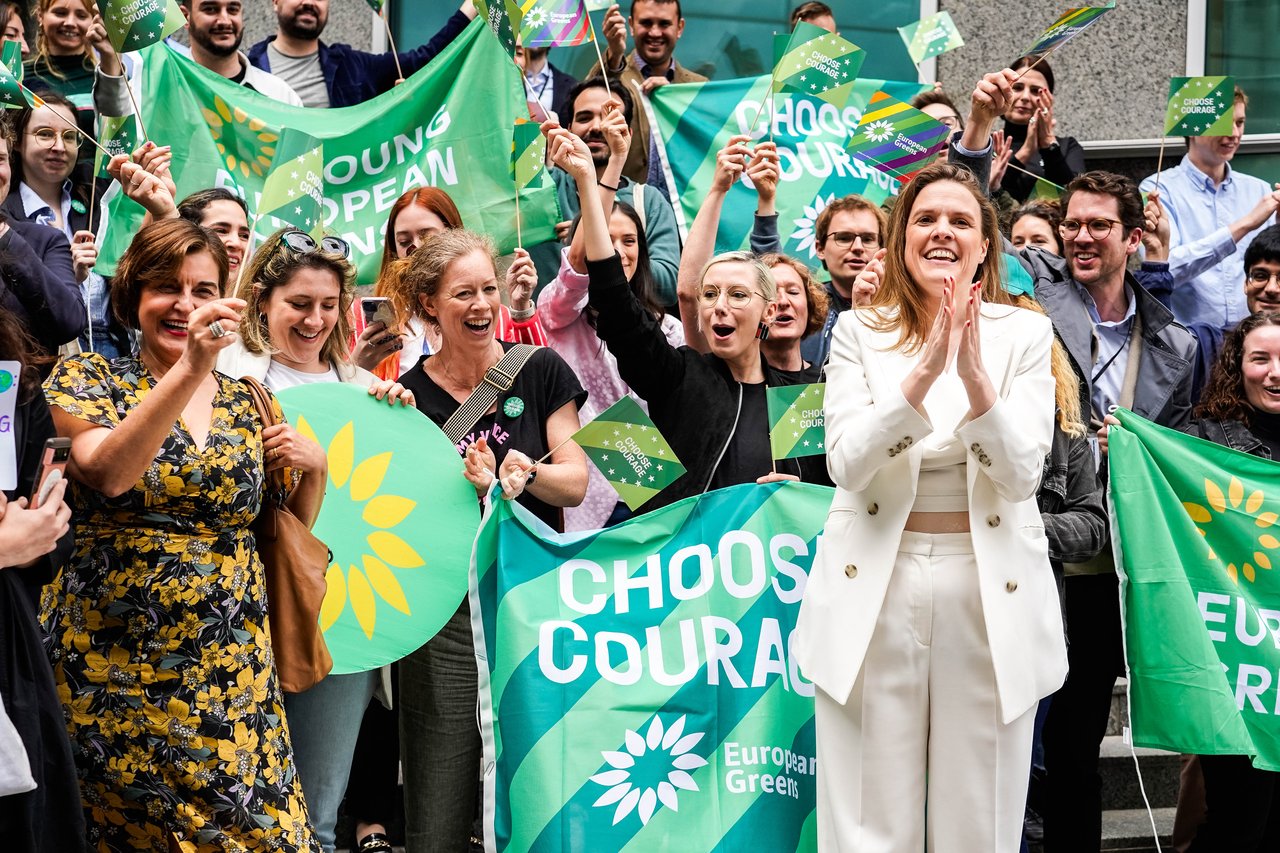Live Update
The political 'Eurovision' - Follow the Spitzenkandidat debate live
The European Union election campaign reaches a peak this week. Following an election debate earlier this week the EU Commission presidential hopefuls will face off in a new televised encounter between the so-called Spitzenkandidaten (lead candidates) taking place this afternoon (Thursday 23 May).
The debate at the European Parliament is organised by the European Broadcasting Union (EBU) - yes, that EBU - and it will be broadcast in multiple languages on public service media channels and various online platforms across all 27 EU member states.
Nicknamed the Eurovision debate, though unlikely to involve any singing, it will feature Ursula von der Leyen for the European People’s Party (EPP), Nicolas Schmit for the Socialists and Democrats (S&D), Sandro Gozi for liberal Renew Europe, Terry Reintke for the European Greens and Walter Baien for the Left.
Notably, far-right parties will be absent from the debate, despite rising steadily in the polls.
Follow our live coverage below:
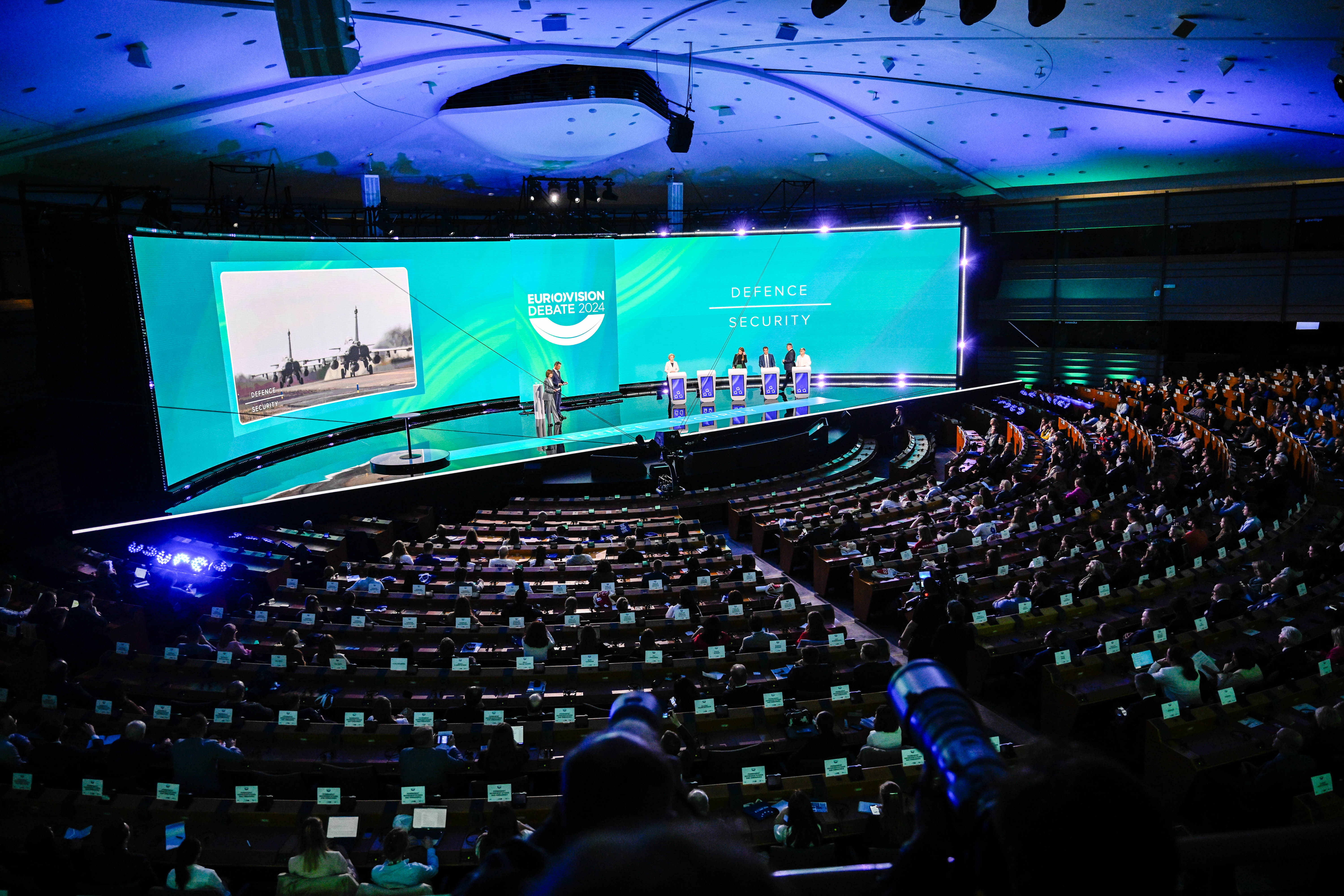
Takeaways (17:22)
The live debate has ended, leaving us with some standout moments.
Schmit (S&D) took a strong stance against von der Leyen for cosying up with Italian prime minister Giorgia Meloni Brothers of Italy party in the ECR’. And he also slammed the Tunisia-EU migration deal arguing that von der Leyen sold it as a “fight against smugglers” while it is a “fight against refugees”.
Von der Leyen (EPP), for her part, maintained a defensive position, highlighting her accomplishments in safeguarding the rule of law in Poland and Hungary, regulating digital platforms and setting up the Green Deal. But she also used the opportunity to pitch the need to move to “incentives” instead of “conditionality” in farm policy.
Meanwhile, Gozi (Renew) proposed an ambitious €100bn investment in European defence, highlighting the need to balance military spending with cultural and educational investments.
Urging action, Reintke (Greens) made a plea for citizens to vote in this election to stop the rise of the far right, calling on Renew to quickly decide on the expulsion of the Dutch VVD party, which recently formed a coalition with the far-right in the Netherlands.
And Baier (The Left) made a powerful case for social justice, advocating for rent caps and stressing that new fiscal rules jeopardise the green transition.
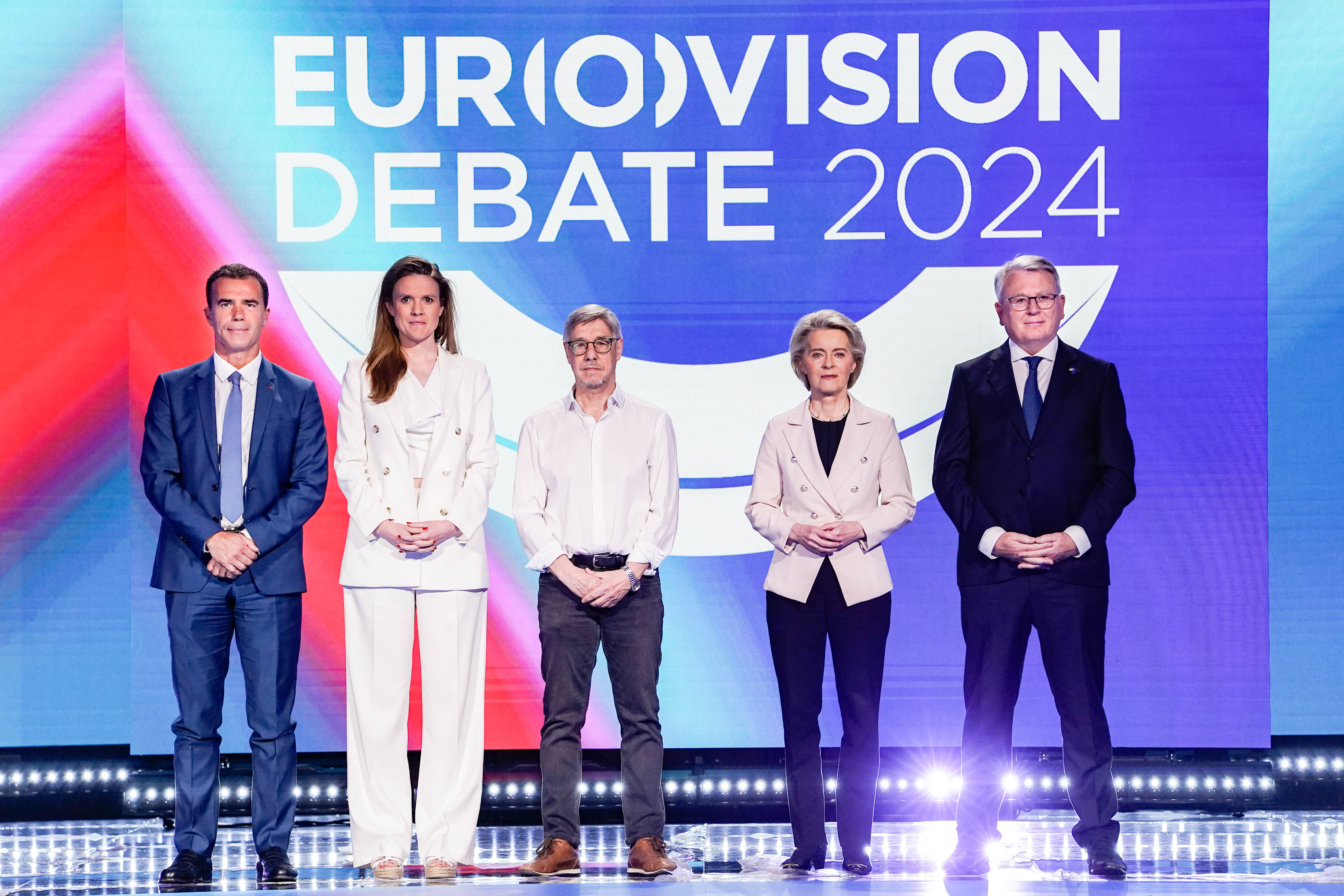
Technological progress comes with risks (16:55)
Asked about technology regulation, Schmit emphasised the importance of investment.
“It’s not austerity policy that helps us, it’s investment that creates progress,” Schmit says, adding that “we need the right kind of finance” through the Capital Markets Union.
Von der Leyen defended the commission's record on regulating technology, highlighting the Digital Service Act, which prompted the withdrawal of TikTok lite amid concerns over its addictive design.
Regarding mental health and the safety of minors, Gozi repeated a policy promoted by French president Emmanuel Macron, arguing for an age of maturity of 15 for internet access.
On deepfakes, Reintke argued that platforms needed to take responsibility for harmful content.
But she ended the debate with an appeal to minorities who feared the future, as a consequence of the far-right surge: “I want to be absolutely clear here: Europe is your home”, she says.
Fighting smugglers vs fighting refugees (16:30)
Reintke pointed towards the benefits of migration. “We need migration to sustain our hospitals,” she says, though she added that proper management was important, by creating legal pathways and sustainable asylum policies.
She emphasised the humanitarian crisis on the EU’s southern border, however. “We need to end the dying in the Mediterranean”, she pleaded, arguing for an EU-wide search and rescue mission.
Gozi supported her call. “First of all, let’s be human: when people are dying at sea, you have to save them,” Gozi says, calling back to his experience in government during the refugee crisis in 2015.
Baier also emphasised his personal experience with asylum, noting that his family which was murdered in Auschwitz was also refused asylum by European countries.
Von der Leyen blamed organised crime and smugglers for the refugee crisis. "We are the ones in Europe who decide who comes to the European Union, and under what circumstances, and not the smugglers and traffickers, this is paramount," says von der Leyen.
After being quiet for a while, Schmit suddenly took aim at von der Leyen, slamming the EU-Tunisia deal, though not by attacking her directly. “This is not Europe. These are not European values. Don’t tell us it's about fighting smugglers, it’s about fighting refugees,” Schmit warns.
Challenged by Gozi on S&D's position on the migration pact, Schmit expressed his qualified support. “It is not perfect, but it is the beginning of better European solidarity, but we should also always keep an eye on our values,” Schmit says.
Von der Leyen, for her part, defended herself saying that it was important to invest in transit countries, suggesting that education investment could help migrants qualify to migrate legally.
Schmit calls out von der Leyen for cosying up with Meloni's ECR (16:15)
Schmit, for his part, called out von der Leyen for filtring with the Italian prime minister Giorgia Meloni (ECR).
"I think that Europe is built on democracy without democracy there is not a real European Union. And that's why we need clarity on that," he says, explicitly calling on von der Leyen to explain what means pro-European parties.
Von der Leyen argues that the true formation of the EU Parliament and its group will become clear only after the elections, but she names three criteria for collaboration. “We need them to be pro-Europe, pro-Ukraine, that is anti-Putin and pro-rule of law,” she says.
When asked explicitly about her potential collaboration with Meloni, she says that the ECR group is "clearly pro-European party" and "pro-rule of law if this holds" — while noting that they do not agree on LBTBIQ+ policies.
"We have to build a majority in the European Parliament for all the topics to bring Europe forward to have a strong Europe. And as we know the European Parliament is very different from national parliaments," she says.
A potential coalition between the EPP and ECR has raised eyebrows, especially considering that one of the largest groups within the ECR is Poland’s Law & Justice (PiS) — a party known for dismantling the rule of law in the country over its past administration.
But von der Leyen also defends her record on the protection of the rule of law in Poland and Hungary, pointing to budget freezes in these countries. “We have the means, and these are biting means.”
Greens urge citizens not to underestimate the far-right (16:01)
Reintke, who is German, refers to Nazi-Germany, saying that back then conservatives and liberals in Germany underestimated the far-right threat in the thirties. “Our task is to make sure that can never happen again.”
She also called out liberal Gozi for the newly-formed Dutch rightwing government coalition, which includes the People’s Party of Freedom and Democracy (VVD), a member of Renew and former prime minister Mark Rutte’s party.
Renew Europe is expected to vote on 10 June on whether to expel the VVD, but for Reintke that would be too late. "Have an extraordinary group meeting and expel VVD from your group. I know that Renew is committed to the European project, so send a very clear signal now," she told Gozi.
Baier also took aim at Gozi for the VVD’s collaboration with the far-right but emphasised the importance of actions. “We must not include the agenda of the far-right,” Baier notes, pointing out how establishment party have taken over their positions of the far-right on migration. “The problem is not migration, it is the far-right.”
Is the Green Deal still alive? (15:50)
EU Commission president von der Leyen speaks first about climate. The Green Deal, which sets targets for 2030 and 2040, is considered one of her big successes but key proposals have been opposed by her own EPP party in the last months of this legislature.
"Now we are in a phase where we have to implement," she says.
She also defends her record on the farmer’s dialogue, pitching the need to move to “incentives” instead of “conditionality” in farm policy and more specific reporting measures.
Schmit, for his part, says that the right climate policy can enhance the right kind of sustainable growth. But he also points out that this would require “huge investments” to decarbonise Europe's economy and social dialogue to make sure no one is left behind.
Meanwhile, the Greens are calling for a green industrial deal for a fundamental reform of the Common Agriculture Policy. “We need sustainability for the climate, but sustainability for farmer’s incomes as well,” Reintke points out.
She argues for the importance of speeding up climate policy, saying that acting later will only get more expensive. “I don’t have five, ten years, I need to change policy right now otherwise it will be too late,” Reintke says.
And Baier says there cannot be a contradiction between a green economy and an efficient economy. “Social justice is not a nice to have, and that requires money” says Baier, lambasting new EU fiscal rules and arguing that repealing austerity rules is the first step for green policy.
On the topic of circular economy, Reintke suggests extending the emissions trading scheme (ETS) - EU carbon market - to resource use as well while Gozi emphasises Renew’s record on circular economy, citing the directive on the right to repair.
Liberals say 'no' to whitewashing of ECR (15:45)
There's a spotlight on Gozi. He once more calls on von der Leyen to respect the cordon sanitaire. “I don’t understand how the EPP could open the door to the ECR,” Gozi says. “You must fight against the extreme right. And sadly, you have two extreme rights in this parliament: ID and the ECR.”
The interviewer presses Gozi on whether the Dutch liberal party VVD will still be welcome in Renew for collaborating with the far-right. “It’s not for me to decide, but I think it’s a mistake,” Gozi said.
Concerns about the rise of the far-right and a potential deal between the centre-right EPP and ECR have come up several times during the debate.
Defence and security — EU's new priority (15:35)
The next topic is defence and security. Seven out of ten EU citizens (71 percent) agree that the EU needs to reinforce its capacity to produce military equipment, according to a new Eurobarometer survey published on Thursday.
“We need a real European power,” said liberal leader Gozi. “Either you’re a power, or you’re on the menu in Beijing or Washington,” he also said, calling for an investment of €100bn, financed through common bonds.
But he also emphasised the importance of cultural values, apart from the purely martial values. “For every euro that you spend on defence, you need to spend on culture and education”, said Gozi.
Echoing similar calls for a real defence fund, Reintke said that she wished defence would not be such a central issue, but that the war in Ukraine has made it central. Pitching defence collaboration as an efficiency measure, she also argued for removing the veto from the council to improve European security.
"We haven't chosen the threats coming from Russia. and the fascist regime in Moscow. So, it is absolutely important for our security ... to invest in defence, but that does not mean that we should not invest in our social cohesion," socialist Schmit said.
Von der Leyen used the opportunity to reaffirm the EU's support for Ukraine. "Ukraine is fighting for our values and all three nations so we have to support Ukraine in the first place. And of course ramp up our own defense at the same time."
Baier, for his part, intervenes forcefully, providing the debate with much-needed interaction: “I’m really amazed that we are talking about peace and security, and no one mentions Gaza. When will the EU put sanctions on Israel to stop the killing in Gaza?” Baier asks von der Leyen.
In response, von der Leyen acknowledges that the situation is catastrophic, and emphasises humanitarian aid and work towards a two-state solution. “It is the only light at the end of the tunnel that Gaza has.”
Jobs, rents and reforms (15:16)
The first topic of this electoral debate is the labour market, one of the most pressing issues for citizens. Outgoing job commissioner Schmit says that the EU has to "mobilise" against poverty adding that "investing in people is key", emphasising the importance of skills.
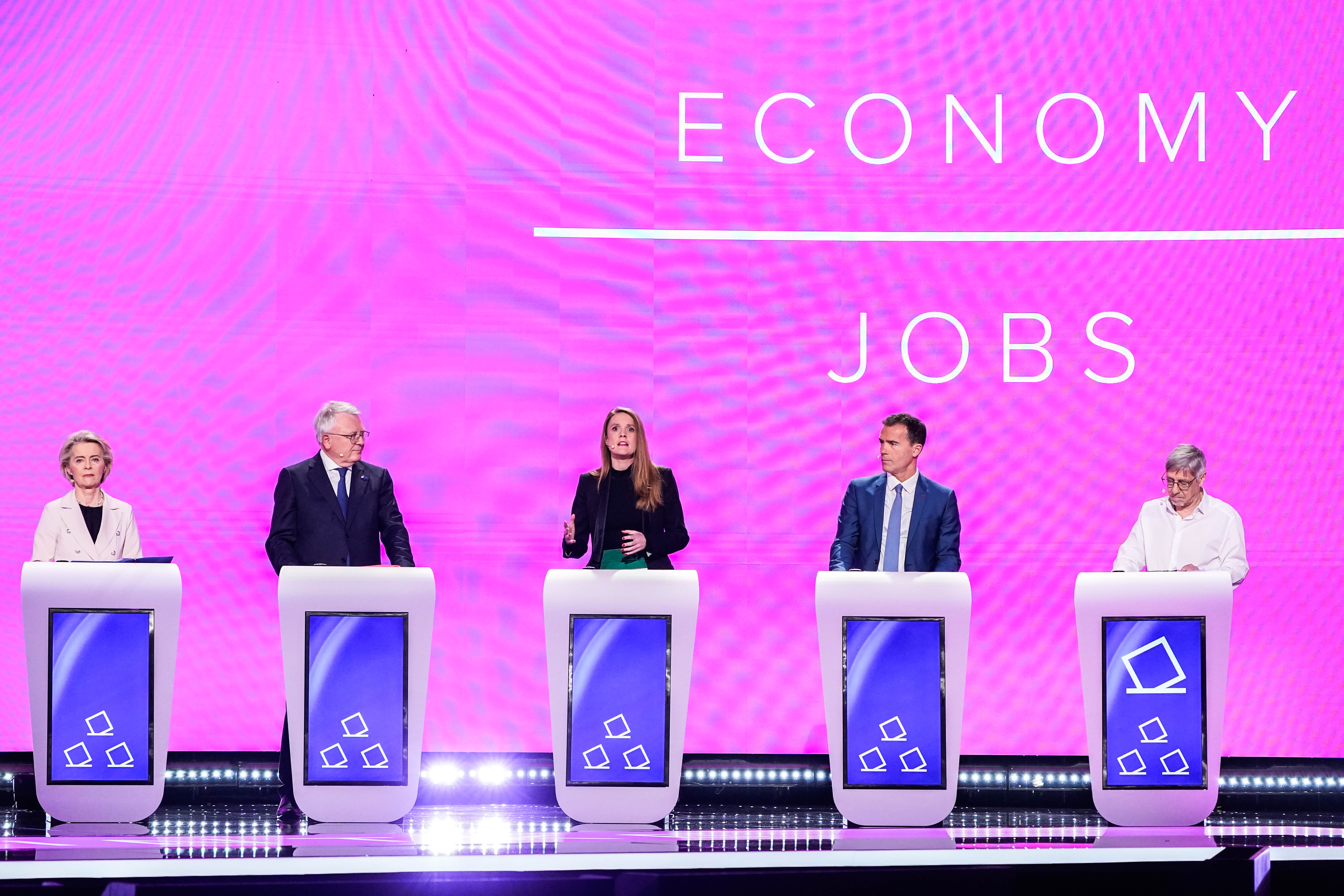
Europe needs to deliver on good social services, Schmit also said, although he is stumbling a bit in his delivery. Reportedly he’s been fighting off a cold today. Asked whether he’s lost touch with the public, Schmit insists that he has responded to the high expectations of citizens.
Greens leader Reintke took the opportunity to emphasise the importance of the Green Deal: "We have to break the contradiction between climate and economy", and criticised the return of austerity. "We need to invest in the future".
And Baier, the Left candidate, brings some concrete ideas to the debate, calling on the EU to introduce a directive on rent caps, drawing applause from the audience.
Asked a question about enlargement, Gozi expressed his support, but argued it was dependent on reform. "It is impossible to enlarge without reform without treaty reform without budget reform, it is clear that we have to rethink and to increase the budget for the Cohesion Policy to increase the budget for the Agricultural policy," liberal Gozi said. It is clear that we have to respond yes to history, but our citizens cannot pay the price."
Von der Leyen, for her part, listed the successes of her commission while pointing out that for the competitiveness of the European Union, it was necessary to access better capital and to complete the capital market union.
We're off! (15:06)
And we're off! Moderators Annelies Beck, from VRT in Belgium, and Martin Řezníček, from Czech TV in Czechia are announcing the candidates.
We're starting with a comment on the elephant in the room: the absence of far-right Identity and Democracy (ID) and the European Conservatives and Reformists (ECR). Řezníček explains once more that they have failed to field formal lead candidates, therefore disqualifying themselves from the debate
Anders Vistisen was excluded for not being the official candidate for the ID, while the ECR refused to field a candidate, calling the Spitzenkandidat-system a sham.
The ECR has a point, though. Despite nominally being a debate between candidates for the presidency, incumbent von der Leyen is the only serious contender. And, ultimately, the name of the potential next EU Commission president will be decided by EU leaders behind closed doors — as already happened in 2019, when von der Leyen was selected instead of EPP leading candidate Manfred Weber.
Liberals slam von der Leyen for flirting with ECR (13:33)
At the doorsteps, Gozi argued that the absence of the far-right ID and ECR was natural. “They don’t want a transnational democracy, they don’t want a stronger Europe,” Gozi said.
Asked about liberals collaborating with the far-right, he said: “We say no, no and no to striking alliances with the far-right at the national level” while adding that he could not monitor parliaments in 27 member states.
Gozi also warned Von der Leyen against cosying up to ECR leader Giorgia Meloni: “I know all roads lead to Rome, but the road von der Leyen is taking won’t bring her very far,” Gozi said.
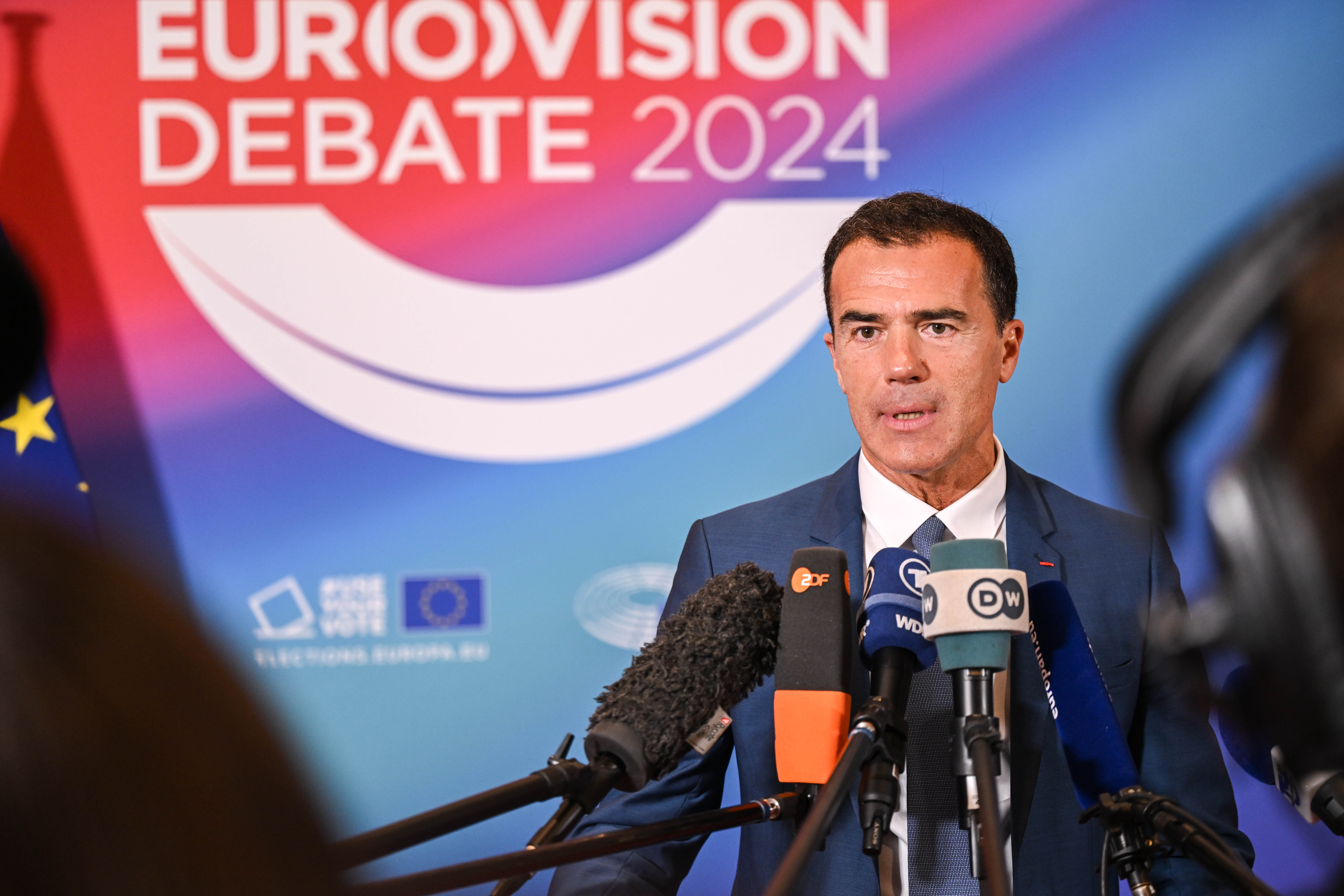
The Left sees recognition of Palestine as ‘step forward’
Walter Baien, the candidate for the Left, said ahead of the debate that the decision by Ireland, Spain and Norway to recognise Palestine as a state is “a step forward”.
“It's good, but it doesn't change the situation on the ground,” he noted.
Baien also said he was hoping the debate would focus on real-life issues, such as jobs, affordable housing, the environment and gender equality.
“If you want to defend your interest in affordable decent housing in secure jobs, and in a healthy environment, you should vote for the left parties in your respective country,” he said at the doorsteps of the debate.
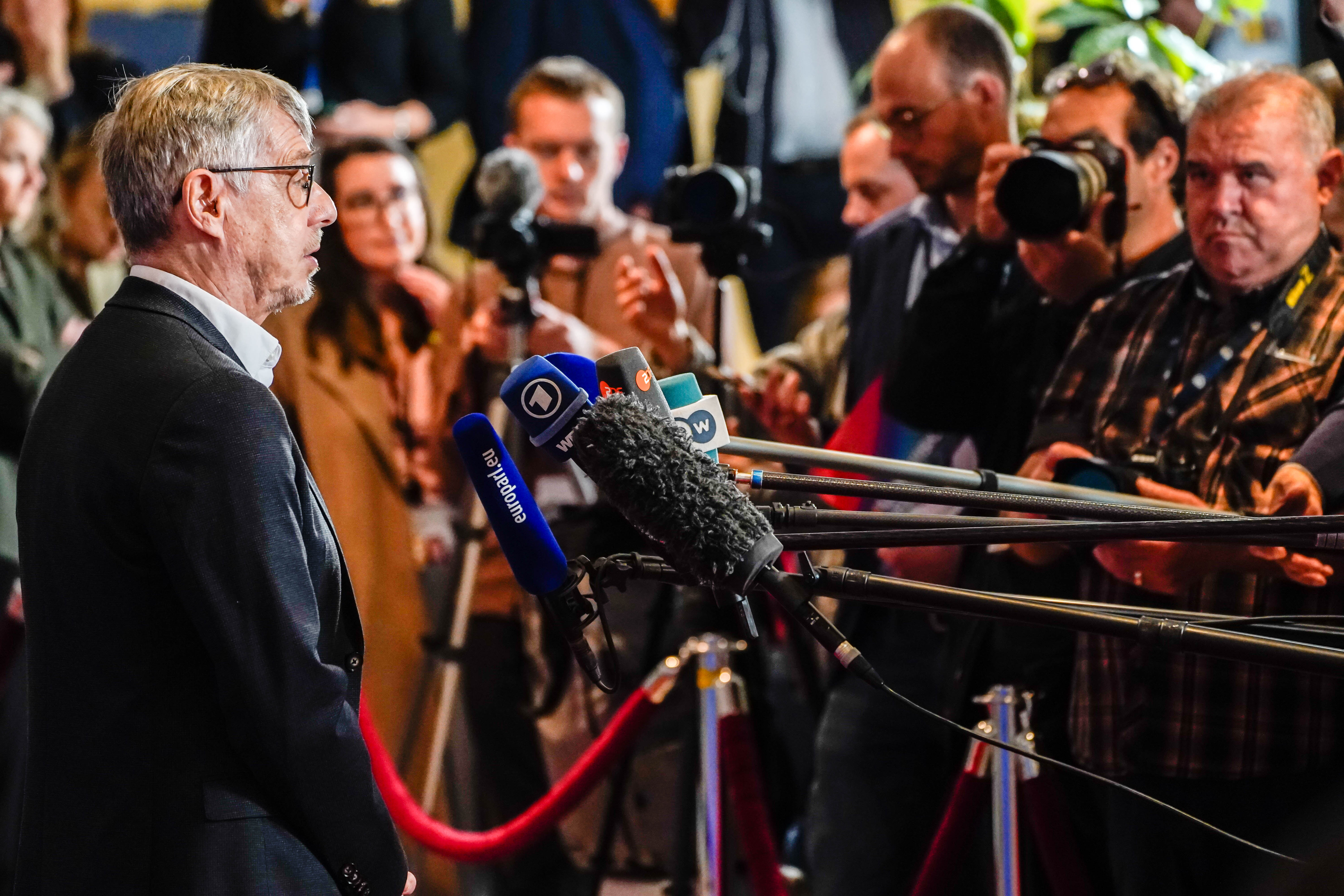
Schmit defends democracy as von der Leyen avoids questions (13:10)
While EPP Spitzenkandidat von der Leyen avoids questions at the doorsteps of the debate, the Socialist lead candidate Schmit has slammed any potential coalitions with far-right parties.
"We want to build a stronger Europe and they want to dismantle Europe. I do not see how you can go into some kind of coalition with these people," he said ahead of the debate.
The Greens accuse liberals and conservatives of killing the Green Deal (13:00)
Greens lead candidate Reintke said ahead of the debate that her party will continue to defend climate action and democracy.
"I think we are at a crucial moment for Europe. The citizens feel this and we need to do everything we can to mobilise people to vote for democratic parties. And of course today I want to convince voters to vote for the Greens," she said before the debate, calling out any coalitions with far-right parties.
In a statement before the debate, the Greens also accused conservatives and liberals of "killing" the Green Deal.
